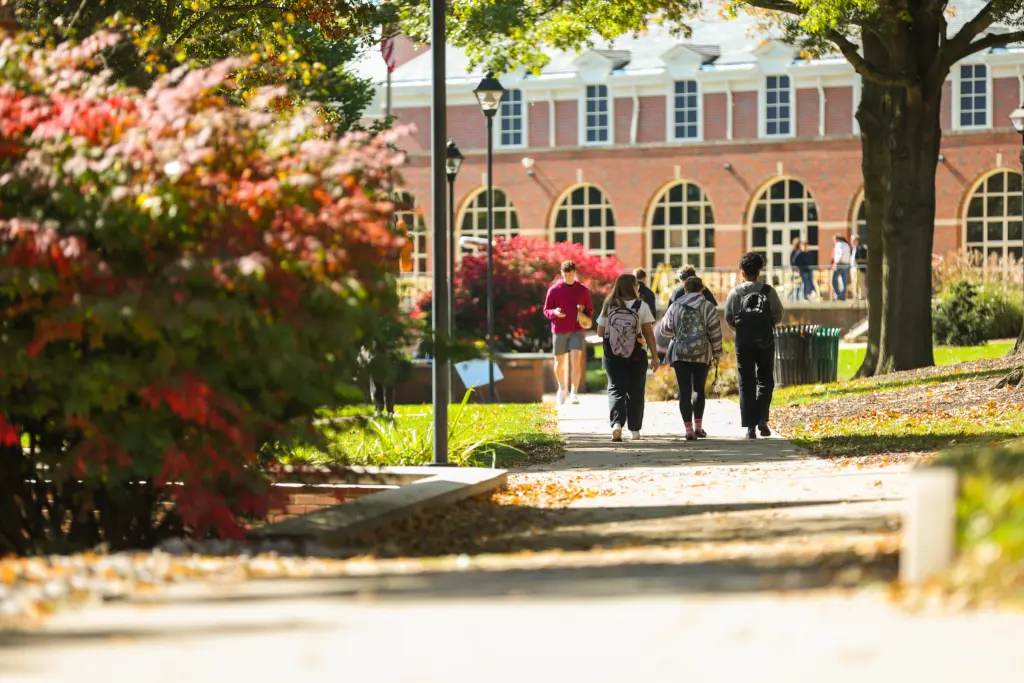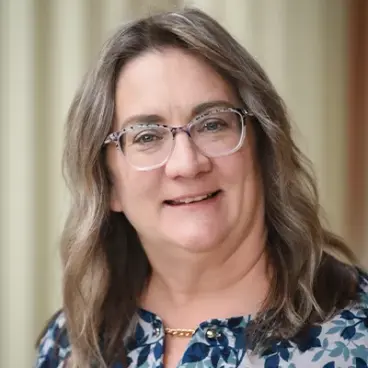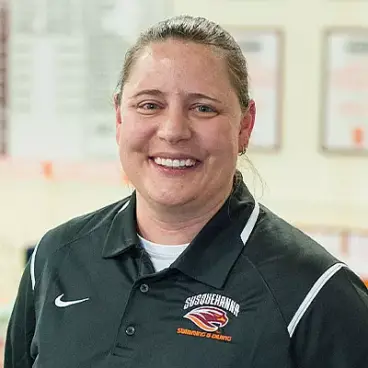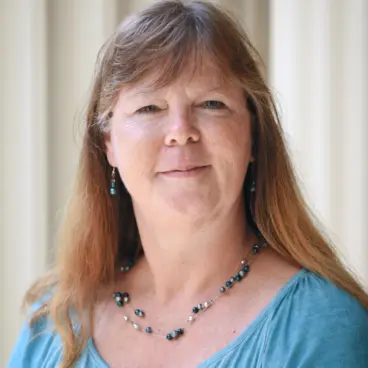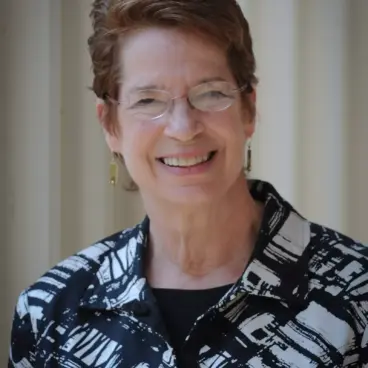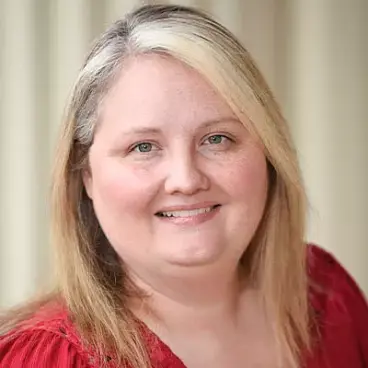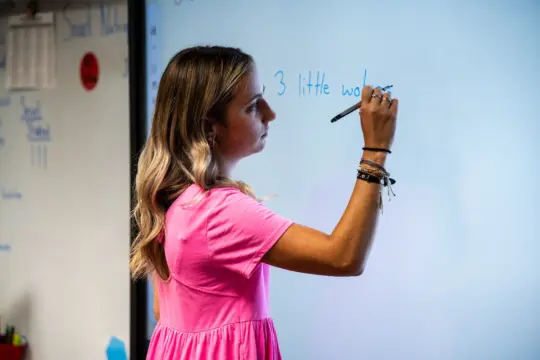
Early Childhood Education Degree
Some consider it a calling, but to become a true educator takes more than just feeling charmed when a child enters the room.
It takes a certain kind of person to teach small children. If you have a passion for understanding child development, if you’re fascinated by how children of different ages think, learn and experience the world, if you believe that all children should receive the teaching, respect and care that they need to thrive, then early childhood education at Susquehanna University is for you.
At Susquehanna, you’ll have abundant opportunities to enter elementary school classrooms, put your learning to practical use and start making a difference right away. Under the supervision of your experienced and caring professors, you will design lessons, create interactive multimedia assignments and harness children’s playful curiosity to help them grow. These unforgettable, real-world experiences will shape the course of your life as an educator.
Because you will be learning and growing too, Susquehanna provides opportunities for you to develop your unique talents and interests in a myriad of ways. You can minor in second-language learning within the department of education or branch out across campus to pick up one of the dozens of other minors. Whatever your interests, you will gain the classroom experience you will need to achieve excellence in the education of our youngest learners.
Early Childhood Education Major Organizes STEAM Festival
Through hands-on experience and mentorship, Susquehanna’s early childhood education program empowers future teachers to inspire learning beyond the classroom.
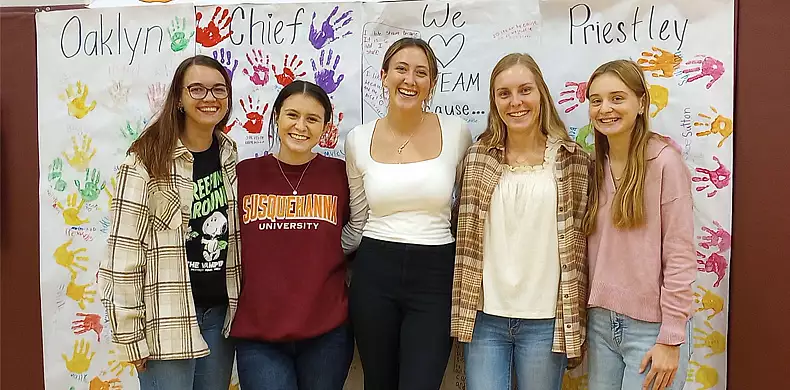
SUsquehanna By the Numbers
More Than Metrics
100%
of seniors complete a supervised research project analyzing their own practice
100%
of students receive student teaching placements in both a preschool and early elementary setting
Plan Your Classroom
Program Resources
Studies of current and past issues in education. Topics vary according to instructor preference. 2-4 SH.
An overview of educational principles, theories and strategies that positively influence student development and learning. Approaches to teaching and learning are based on an understanding of children as individuals and as members of a group. Prerequisite: EDUC-101. 4 SH. CC: Social Interactions, Writing Intensive.
An overview of psychological and educational principles as they apply to the classroom. Topics include instructional planning, developmental characteristics of students and learning theories. Also covers evaluation, discipline and classroom management. Prerequisite: EDUC-101 or MUED-200. 4 SH. CC: Social Interactions, Writing Intensive.
An overview of the needs of students with disabilities in multiple settings, examining both typical and atypical development, as well as all major areas of exceptionality and instructional strategies that support student success in inclusive classrooms. Additionally, legal, ethical and professional responsibilities of teachers working with children with disabilities, including those with multicultural and multilingual backgrounds are emphasized. Includes required special education school-based field experiences. Pre-requisites: EDUC-101. 4 SH. CC: Diversity Intensive.
Explores methods of designing and delivering effective instruction for individuals with special learning requirements. Prerequisites: EDUC-260 and either EDUC-240 or EDUC-250. 4 SH.
This course focuses on child development for children in pre-kindergarten through grade 4 and the ways in which child development interacts with teaching and learning. Particular attention will be paid to developmentally appropriate practices and the role of play as a teaching medium. Research-based teaching strategies will be highlighted. Students will demonstrate their in-depth understanding and analyses of concepts and constructs applied to important issues that have implications for the home, school and community. This is a course with additional field experiences at early childhood sites. All Education Department clearances must be obtained by the beginning of this course. Prerequisite: EDUC-101. 4 SH.
This course emphasizes experiential learning and builds upon students’ understanding of the diverse needs of children who are struggling and those with identified mild disabilities, particularly in terms of research-based approaches to provide effective instruction in inclusive and special education classrooms. Students will learn how to develop and implement appropriate and individualized standards-aligned instruction for learners who have Individualized Education Plans (IEPs). Students will identify and implement research-based learning/teaching strategies to promote learners’ progress (focusing on both those with high incidence disabilities) as well as a range of ways in which to differentiate instruction and implement universal design for learning principles to meet individual needs in all content areas. Only available to students accepted into the Special Education (PreK-8) Dual Certification program. Prerequisites: sophomore class standing and successful completion of EDUC 240 and EDUC 260. 4 SH.
EDUC-300A and EDUC-300M cover basic music and art fundamentals, methods of music and art instruction in elementary classrooms, and strategies for integrating these subjects into other elementary topics. These are taught as two separate 2SH sections. Students must complete both EDUC-300A and EDUC-300M to fulfill the Artistic Expressions requirement. Prerequisites: sophomore standing and EDUC-101. CC: Artistic Expression.
EDUC-300A and EDUC-300M cover basic music and art fundamentals, methods of music and art instruction in elementary classrooms, and strategies for integrating these subjects into other elementary topics. These are taught as two separate 2SH sections. Students must complete both EDUC-300A and EDUC-300M to fulfill the Artistic Expressions requirement. Prerequisites: sophomore standing and EDUC-101. CC: Artistic Expression.
Methods of developing instructional strategies beginning with preschool-aged children and including numbers and operations, algebraic concepts, geometry and measurement, and data analysis and probability. This course will focus on developing conceptual understanding of math skills using hands-on and virtual manipulatives and using research-based instructional strategies. This knowledge will be applied in field experiences. Prerequisites: EDUC-101. 4 SH
Methods of developing instructional strategies in all strands of the mathematics curriculum beginning with early elementary-aged children. Topics include numbers and operations, algebraic concepts, geometry and measurement, and data analysis and probability. This course will focus on developing conceptual understanding of math skills using hands-on and virtual manipulatives and using research-based instructional strategies. This knowledge will be applied in field experiences. Prerequisites: EDUC-310 and admission to a teacher education program. 4 SH
This required course will address knowledge and skills educators need to plan individualized programs for students with moderate and severe disabilities, including those with physical and cognitive impairments as well as autism. Emphasis will be on teaching and supporting students within both special education and regular classes/typical school activities, based on a vision of adult participation in typical community activities and settings. Associated topics of discussion include learning characteristics of students with moderate and severe disabilities, program planning and IEP development, assessment and instructional planning in foundation skills, communication, assistive technology, supporting participation and progress in the general education curriculum, social skills and facilitating peer relationships, and transition planning. Only available to students accepted into the Special Education (PreK-8) Dual Certification program. Prerequisites: Sophomore class standing and successful completion of EDUC 240 and EDUC 260. 4 SH.
The theory and practice of using educational technology in the classroom. Includes practice with computers, multimedia and telecommunications. Prerequisite: EDUC-101. 2 SH.
This course will focus on having students develop a foundational understanding of behavior modification principles and classroom management strategies in order to be able to most effectively teach any type of student in an inclusive setting. Special attention will be given to individuals with emotional and behavior disorders and a variety of techniques for implementing specific behavior intervention strategies at the school-wide and classroom levels will be discussed in addition to appropriate assessment procedures and behavior plan writing. Students will also learn evidence-based methods for providing academic instruction in core content areas for this population of students. Only available to students accepted into the Special Education (PreK-8) Dual Certification program. Prerequisites: Sophomore class standing and successful completion of EDUC 240 and EDUC 260. 4 SH.
Using knowledge of language systems, language acquisition and sociocultural influences on learning and communication to design instruction and assessment for students whose home language is not English. Includes field experiences. Prerequisites: Either MUED-200 or EDUC-101. 4 SH. CC: Diversity
An overview of research on and theories of young children’s language development and methods of assessing and guiding the development of language skills in very young children, including skills that facilitate later learning of reading and writing. Includes field experiences at early childhood sites. Prerequisites: EDUC-101. 4 SH.
This course will present a balanced, comprehensive program of scientifically-based research instruction in reading, writing, and related language arts. emphasizing the teaching of phonemic awareness, phonics, fluency, vocabulary development and comprehension strategies for all students in Pre-Kindergarten through Grade 4, including students with varied reading levels and language backgrounds. This course includes required field experiences in schools. Prerequisite: Either EDUC-280 or EDUC-365. 4 SH.
Methods of assessing young children’s literacy development and providing interventions suited to the needs of each child. Includes field experiences at school sites. Prerequisites: EDUC-365 and EDUC-366. 4 SH. CC: Writing Intensive.
An introduction to a broad range of approaches to successful tutoring, this course focuses particularly on addressing diverse learning styles and understanding the impact of social-cultural differences on learning. Students will develop diverse peer tutoring strategies to facilitate learning and will be prepared to serve as tutors in a variety of settings. Prerequisite: GPA of 2.75 or instructor’s approval. 2 SH.
Methods of designing instruction to enhance student learning by using clear objectives, appropriate assessment and flexible learning activities that conform to state curriculum standards. Prerequisites: EDUC-101. 2 SH.
Methods of designing and using a wide range of assessment types and assessment data to implement instructional or programmatic revisions in education. Includes field experiences at school sites. Prerequisites: A Central Curriculum Analytical Thought course, senior standing, and admission to the teacher education program. 2 SH.
Methods of designing and delivering effective instruction in social studies in early childhood classrooms. Includes field experiences at school sites. Prerequisites: Senior standing and elementary education major. 4 SH. CC: Team Intensive.
Examines the connections among schools, families and communities and methods teachers can use to establish and maintain positive collaborative relationships with the families of their students. Includes field experiences at school or community sites. Prerequisites: Senior standing and admission to the teacher education program. 2 SH.
The course covers methods and materials used in assessing students who may be eligible for special education. Class sessions will involve experiential learning activities related to the assessment of students. Students will take this course the semester before student teaching, in concurrence with a practicum. This course includes technical prerequisites of understanding standardized assessment and the rationale for using curriculum-based measurement (CBM) within the broad context of special education programming. Students will develop competencies in utilizing norm-referenced, criterion-referenced, curriculum-based, and teacher-made assessment for instructional and placement decisions. Only available to students accepted into the Special Education (PreK-8) Dual Certification program. Prerequisites: Senior class standing, EDUC-999 admission to the teacher education program, and successful completion of EDUC-240 and EDUC-260. 4 SH.
Methods courses in the secondary program address content and techniques used to develop and implement instruction in the specific content area. (Music education majors should refer to the music department’s methods course list.) All methods courses include field experiences. These courses are taken in the first semester of the senior year as part of the Secondary Education Methods Block. Prerequisites: Senior standing and EDUC-999 admission to the teacher education program. 2 SH.
Methods courses in the secondary program address content and techniques used to develop and implement instruction in the specific content area. (Music education majors should refer to the music department’s methods course list.) All methods courses include field experiences. These courses are taken in the first semester of the senior year as part of the Secondary Education Methods Block. Prerequisites: senior standing and EDUC-999 admission to the teacher education program. 2 SH.
Methods courses in the secondary program address content and techniques used to develop and implement instruction in the specific content area. (Music education majors should refer to the music department’s methods course list.) All methods courses include field experiences. These courses are taken in the first semester of the senior year as part of the Secondary Education Methods Block. Prerequisites: senior standing and EDUC-999 admission to the teacher education program. 2 SH,
Methods courses in the secondary program address content and techniques used to develop and implement instruction in the specific content area. (Music education majors should refer to the music department’s methods course list.) All methods courses include field experiences. These courses are taken in the first semester of the senior year as part of the Secondary Education Methods Block. Prerequisites: senior standing and EDUC-999 admission to the teacher education program. 2 SH.
Methods courses in the secondary program address content and techniques used to develop and implement instruction in the specific content area. (Music education majors should refer to the music department’s methods course list.) All methods courses include field experiences. These courses are taken in the first semester of the senior year as part of the Secondary Education Methods Block. Prerequisites: senior standing and EDUC-999 admission to the teacher education program. 2 SH.
Methods courses in the secondary program address content and techniques used to develop and implement instruction in the specific content area. (Music education majors should refer to the music department’s methods course list.) All methods courses include field experiences. These courses are taken in the first semester of the senior year as part of the Secondary Education Methods Block. Prerequisites: senior standing and EDUC-999 admission to the teacher education program. 2 SH.
Business, Communications and IT Methods prepares students to develop and implement instruction in the K-12 Business classroom setting. This course includes field experiences and is taken in preparation for student teaching. Prerequisites: Approval of Teacher Intern Program Director. 2 SH.
Methods of Teaching Art (Methods of Curriculum, Instruction and Assessment in Art) prepares students to develop and implement instruction in the pK-12 Art classroom setting. This course includes field experiences and is taken in preparation for student teaching. Prerequisites: Approval of Teacher Intern Program Director. 2 SH.
Methods of teaching scientific knowledge and the elements of scientific thinking and experimenting in developmentally appropriate ways to children through fourth grade. Includes field experiences at schools and other sites and may include one or more Saturdays. Prerequisites: INTD-320. 4 SH.
This course focuses on the academic language needed for ELLs to be successful in U.S. schools. The course begins with an emphasis on foundational knowledge of language structures (i.e., English phonology, morphology and syntax) as well as a thorough review of key theories and principles in first and second language acquisition. The course looks at the particular issues faced by students at different points in their education: elementary, middle and high school, as well as the role of literacy in content area learning. Students will understand the complexities associated with reading and writing development in more than one language. The tutoring component of the course will give students an opportunity to apply theoretical knowledge to practice and conduct hands-on analyses and diagnostic assessments. Prerequisite: EDUC 350. 4 SH.
In this course, sociocultural and political dimensions of language learning and teaching are explored. Learning a language is not a politically neutral enterprise: Issues of power are related to who is encouraged to learn a language and who is prevented from accessing linguistic resources. The course emphasizes the interplay between the macro-level relations of power in society and the micro-level experiences of language learners by focusing on sociocultural, political, racial, and economic perspectives. Throughout the semester, you will be encouraged to make connections between theory and practice. As part of making connections between theory and practice, 20 hours of field experience will be a part of the course assignments and requirements. Prerequisites: EDUC-350. 4 SH. CC: Diversity.
The purpose of this course is to introduce students to current research-based methods, strategies, frameworks and resources in K-12 ESL education, with an emphasis on both curriculum and assessment components. The course offers a critical overview of a variety of ESL teaching methods, with the focus on recent developments in content-based, task-based and critical pedagogies, in addition to appropriate assessment principles and techniques. Students will also explore a variety of ways to use technology for instructional purposes. The course includes a concurrent, required field experience (20 hours total; two observation hours per week) where candidates will work with an ELL in the field, identify their instructional needs through assessment and then work with the learner to meet instructional needs through different forms of curriculum. Prerequisite: EDUC-350. 4 SH.
This course is designed as an introduction to how first and, in particular, second languages are learned. The hope is that students will use what they learn to teach individuals who have a second/additional language. All course topics weave in discussion on the role of language in teaching and learning, as well as stress the relevant implications for effective instruction in culturally and linguistically diverse classrooms. Students will gain an understanding of the historical development of language acquisition theories, and how they have led to modern hypotheses on language learning and classroom practices. By the end of the course, the students will write action plans that explain their understanding of language acquisition and how it applies to classroom environments. There is no required field experience for this course. 4 SH.
A study of current curricular and instructional practices. Topics include components of professional practice, planning and preparation, classroom environment, classroom assessment, and professional development. (A summer section of EDUC-479 may be offered for students participating in the Teacher Intern Program. This summer section carries two semester hours of credit and is not available to undergraduate students.) This course is taken in the first semester of the senior year as part of the Secondary Education Methods Block (see secondary education in the education course requirements section.) This course includes a practicum. Prerequisites: Senior standing and EDUC-999 admission to the teacher education program. 4 SH.
An overview of the current models of classroom management and strategies for meeting diverse needs and unique abilities of students from many different backgrounds. Topics include classroom management techniques for exceptional learners, urban and rural students, and culturally and linguistically diverse students. Includes field experiences at a school site. This course is taken in the first semester of the senior year as part of the Secondary Education Methods Block. Prerequisites: Senior standing and EDUC-999 admission to the teacher education program. 2 SH.
A course for seniors in the early childhood (PreK-4) certificate program, which covers methods of early childhood teaching, including instructional planning, responsive classroom management, diversity in the classroom and professional ethics. The second half of the course is spent at the school site with the cooperating teacher to whom each senior is assigned for student teaching in the spring semester. Prerequisites: Senior standing in the elementary education major and EDUC-999 admission to the teacher education program. 4 SH.
students must be admitted to the teacher education program (EDUC-999) and apply and be approved for student teaching.
Taken together, EDUC-501, EDUC-502, EDUC-503 and EDUC-600 require observation and student teaching in nearby schools under supervision of a public school teacher and a university supervisor and attendance at a weekly seminar. During this 15-week period, students in early childhood education spend a minimum of 450 hours of observation/teaching experience, and students in secondary education spend a minimum of 420 hours of observation/teaching experience. To enroll in this block of courses, students must be admitted to the teacher education program and have approval from their advisers. Students may not enroll in any additional courses for this semester without prior written approval from the head of the Education Department. Prerequisites: All other courses required for the major and for the teacher education program, as well as EDUC-999 admission to the teacher education program. Capstone for elementary education majors. 4 SH.
Taken together, EDUC-501, EDUC-502, EDUC-503 and EDUC-600 require observation and student teaching in nearby schools under supervision of a public school teacher and a university supervisor and attendance at a weekly seminar. During this 15- week period, students in early childhood education spend a minimum of 450 hours of observation/teaching experience, and students in secondary education spend a minimum of 420 hours of observation/teaching experience. To enroll in this block of courses, students must be admitted to the teacher education program and have approval from their advisers. Students may not enroll in any additional courses for this semester without prior written approval from the head of the Education Department. Prerequisites: All other courses required for the major and for the teacher education program, as well as EDUC-999 admission to the teacher education program. Capstone for elementary education majors. 4 SH.
Taken together, EDUC-501, EDUC-502, EDUC-503 and EDUC-600 require observation and student teaching in nearby schools under supervision of a public school teacher and a university supervisor and attendance at a weekly seminar. During this 15- week period, students in early childhood education spend a minimum of 450 hours of observation/teaching experience, and students in secondary education spend a minimum of 420 hours of observation/teaching experience. To enroll in this block of courses, students must be admitted to the teacher education program and have approval from their advisers. Students may not enroll in any additional courses for this semester without prior written approval from the head of the Education Department. Prerequisites: All other courses required for the major and for the teacher education program, as well as EDUC-999 admission to the teacher education program. Capstone for elementary education majors. 4 SH. CC: Ethics Intensive.
This course examines contemporary issues and challenges in public education. It explores the history of education in the United States and discusses objectives behind creating a public school system. Theories and concepts related to the policymaking process are explored, and resulting policies are analysis and contextualize within the field of education. Finally, the course investigates recent education reforms and, where possible, seeks to analyze the consequences of these reforms. Same as PPOL-353. Prerequisites: EDUC 101, junior or senior standing. 4 SH. CC: Writing Intensive.
Taken together, EDUC-501, EDUC-502, EDUC-503 and EDUC-600 require observation and student teaching in nearby schools under supervision of a public school teacher and a university supervisor and attendance at a weekly seminar. During this 15-week period, students in early childhood education spend a minimum of 450 hours of observation/teaching experience, and students in secondary education spend a minimum of 420 hours of observation/teaching experience. To enroll in this block of courses, students must be admitted to the teacher education program and have approval from their advisers. Students may not enroll in any additional courses for this semester without prior written approval from the head of the Education Department. Prerequisites: All other courses required for the major and for the teacher education program, as well as admission to the teacher education program. Capstone for elementary education majors. 2 SH.
A detailed exploration of a selected educational topic or problem under faculty direction. Project may relate to the development of a significant skill in teaching. Requires approval of supervising professor and department head. 1-4 SH.
The historical, philosophical and sociological foundations that form a basis for the development, organization, and role of US public education and other social institutions will be examined. Students will analyze the preparation of teachers, the cultural environments within which teachers are trained, and how social, cultural, political and economic forces shape schools. A critique of the literature will include cultural identity formation and construction, teaching philosophies and schools as political and bureaucratic structures. The goal of the course is to challenge assumptions about how schools are organized and stratified and how both are linked to mobility of and reproduction of the prevailing social order. 4 SH.
This course examines theory, research and practice of K-12 school curriculum. Students will evaluate past and current processes of curriculum development in relation to standards, learning objectives, assessment, instructional methods and student needs. 4 SH.
This course introduces students to a variety of research methods common to the field of education. Quantitative, qualitative and mixed methods approaches will be examined. The course will focus on the research process from identifying research problems through the creation and report of original research. Students will locate, analyze and interpret educational research and use these skills to identify areas of inquiry for the completion of their Master’s Paper. 4 SH.
This graduate-level course analyzes the methods and materials necessary to accurately assess students within inclusive classroom settings and students who may be eligible for special education. Through experiential learning activities, students will apply the language and terminology required to assess and evaluate students to the creation of assessment tools. This course includes technical prerequisites of understanding standardized assessment and the rationale for using curriculum-based measurement (CBM) within the broad context of special education programming. Students will develop competencies in utilizing norm-referenced, criterion-referenced, curriculum-based and teacher-made assessment for instructional and placement decisions. Students will also be required to track the performance of a child with special needs and explain the rationale for the application of particular student performance goals based on interpretation of collected data sets. 4 SH.
Educators will learn the knowledge and skills needed to plan Individualized Education Programs (IEPs) for students with moderate and severe disabilities in this graduate-level course. Moderate and severe disabilities include those with physical and cognitive impairments as well as autism. Emphasis will be on teaching and supporting students within both special education classrooms and typical school settings, based on a vision of adult participation in typical community activities. Associated topics of discussion include the history/treatment of individuals with moderate and severe disabilities in our society, learning characteristics of students with moderate and severe disabilities, program planning and IEP development, assessment and instructional planning in foundational skills, communication, assistive technology, supporting participation and progress in the general education curriculum, social skills and facilitation peer relationships and transition planning. 4 SH.
This graduate-level course emphasizes research-based practices to provide effective instruction in inclusive and special education classroom settings. Students will learn how to meet the diverse learning needs of individuals with mild disabilities and how to develop and implement appropriate and individualized standards-aligned instruction for learners who have Individualized Education Plans (IEPs). Students will identify and implement research-based learning and teaching strategies to promote learners’ progress (focusing on both those with high incidence disabilities). Students will also select strategies for instructional differentiation and universal design for learning principles for use within their appropriate content areas in both inclusive and special classroom settings based upon learner characteristics and interpretation of assessment data. 4 SH.
This course focuses on the academic language needed for ELLs to be successful in U.S. schools. The course begins with an emphasis on foundational knowledge of language structures (i.e., English phonology, morphology and syntax) as well as a thorough review of key theories and principles in first and second language acquisition. The courses looks at the particular issues faced by students at different points in their education: elementary, middle and high school, as well as the role of literacy in content area learning. Students will understand the complexities associated with reading and writing development in more than one language. The tutoring component of the course will give students an opportunity to apply theoretical knowledge to practice and conduct hands-on analyses and diagnostic assessments. 4 SH.
Sociocultural and political dimensions of teaching and language learning are explored in this graduate-level course. Learning a language is not a politically neutral enterprise: Issues of power are related to who is encouraged to learn a language and who is prevented from accessing linguistic resources. The course emphasizes the interplay between the macro-level relations of power in society and the micro-level experiences of language learners but focusing on sociocultural, political, racial and economic perspectives. Students will analyze the influence of nonverbal communication skills within intercultural contexts and explain how research on language learning should inform teacher planning, instruction, and assessment. Throughout the semester, students will make connections between theory and practice through completion of a 20-hour field experience. 4 SH.
This graduate-level course will examine current research-based methods, strategies, frameworks and resources in schools for teaching English Language Learners, with an emphasis on both curriculum and assessment. ESL teaching methods will be analyzed and critiqued. Particular emphasis will be placed on the recent developments in content-based, task-based and critical pedagogies, as well as appropriate assessment principles and techniques. Students will also acquire skills in using technology for instructional purposes. The course includes a concurrent, required field experience (20 hours) where candidates will work with an ELL student to identify their instructional needs through assessment, apply research-based methods to address the student’s needs, and then work with the learner to meet instructional goals. 4 SH.
This graduate-level course analyzes how languages are learned. Students will analyze, interpret and track scholarly debate of concepts related to second language acquisition and apply this knowledge to plan and teach individuals who are not native English speakers. The role of language in teaching and learning is explored throughout the term. The relevant implications for effective instruction in culturally and linguistically diverse classrooms is also emphasized. Students will track the historical development of language acquisition theories and explain how they have led to modern hypotheses on language learning and classroom practices. By the end of the course, students will create action plans that explain their understanding of language acquisition and its effective application to classroom environments. There is no required field experience for this course. 4 SH.
This course will focus on having students develop a foundational understanding of behavior modification principles and classroom management strategies in order to be able to most effectively teach any type of student in an inclusive setting. Special attention will be given to individuals with emotional and behavior disorders and a variety of techniques for implementing specific behavior intervention strategies at the school-wide and classroom levels will be discussed in addition to appropriate assessment procedures and behavior plan writing. Students will also learn evidence-based methods for providing academic instruction in core content areas for this population of students. 4 SH.
This course prepares educators to teach K-12 students to critically read and create media. Critical media literacy combines theoretical foundations of cultural studies and critical pedagogy with practical classroom applications of new digital media as well as traditional print-based means of communication. Educators will analyze media formats and technology and question their purposes and use for communication inside and outside of the classroom. 4 SH.
This course will study the systematic approach to planning curriculum and instruction for academically diverse learners within inclusive classroom settings. Background information tracing how special education and policies affecting general education teachers will be reviewed. Participants will learn concepts and strategies to promote successful social and academic integration of children with various abilties. Emphasis will be placed on classroom elements the educator can modify to increase learning opportunities and efficiency for students. 4 SH.
This course will examine critical issues in education over time. It will focus on the social, political, cultural and economic struggle to control education and delve into the present and possible future trajectories of debate through a review of seminal and contemporary educational literature. Students will analyze particular interests served by schools, what should be taught in schools, who should have access to schooling and what environments are most conducive to student learning. 4 SH.
EDUC-780 Trending Topics in Education Trending Topics in Education addresses a variety of current issues and special interests in the field of education. The course will respond to contemporary trends and issues of importance to students and teachers in Pennsylvania as well as further afield. 1-4 SH
A detailed exploration of a selected educational topic or problem under faculty direction. Projects may be related to the development of a significant skill in teaching, learning, or research. Requires approval of supervising professor and department head. 1-4 SH.
The Master’s Paper is the capstone requirement of the program. The Master’s Paper will be question-oriented and analytically investigate an aspect relevant to the student’s interests and/or career goals. The composition must reflect proficiency of program learning goals. Successful completion and evaluation of the Master’s Paper by department faculty is required prior to graduation. Prerequisite: Completion of four (4) core courses required for the Master of Education degree. 4 SH.
Students in this course will examine the disciplines of the natural sciences (physics, chemistry, biology, earth and space) together with related technologies. The course introduces students to science as a human activity with a long history and the following habits of mind: values and attitudes, computation and estimation, manipulation and observation, communication, and critical-response skills. Particular attention is given to the underlying themes of science: systems, models, constancy and change, and scale. Laboratories will be taught together with the lecture portion of the class; however, some laboratory experiences may be held on Saturdays. Prerequisites: sophomore standing, completion of the Analytical Thought requirement, and either MUED-200 or EDUC-101. 4 SH. CC: Interdisciplinary, Scientific Explanations, Team Intensive
This course is designed for secondary education, modern language education and music education students. Course instruction will be structured following principles of interdisciplinary instruction and inquiry-based learning. Required lab components are integrated with instruction. Students will analyze and apply their developing understanding of interdisciplinary instruction and inquiry-based learning in order to create original learning activities and lesson plans that incorporate concepts from their respective teaching disciplines. Prerequisites: sophomore standing and completed the Central Curriculum Analytic Thought requirement and EDUC-101 or MUED-200.
When you enroll at Susquehanna, you’ll be paired with an advisor and application tool to guide you in your course planning and scheduling. The following is an excerpt from the complete course catalog. Enrolled students follow the requirements of the course catalog for the academic year in which they declare each major and/or minor, consult with their advisor(s).
Since 1904, Susquehanna University has prepared liberal arts students for careers in teaching and education related fields. Students enrolled in education majors that lead to teacher certification master the professional knowledge and skills necessary for state certification and for developing successful and rewarding careers in education.
Upon completion of an education program, students will have learned to:
- Design instruction and prepare for all aspects of managing a learning environment;
- Instruct students and assess their learning;
- Maintain a learning environment that is welcoming, respectful and productive; and
- Fulfill other professional responsibilities.
Learning Goals
- Understand how children learn and develop and can provide learning opportunities that support their intellectual, social and personal development.
- Understand and use a variety of instructional strategies to encourage students’ development of critical thinking, problem solving and performance skills.
- Create a learning environment that encourages positive social interaction, active engagement in learning and self-motivation.
- Prepare and plan instruction based on knowledge of subject matter, students, curriculum goals, and formal and informal assessment strategies.
- Include every student — accommodating, adapting and/or differentiating instruction as appropriate, considering readiness, history, interests, achievement and learning styles; cultural, racial, social and ethnic affiliations; and exceptional needs and abilities.
- Use effective verbal, nonverbal and media communication techniques to foster active inquiry, collaboration and supportive interactions in the classroom.
- Function effectively within community-wide systems of education.
- Evaluate the effects of his/her choices and actions on others (students, parents and other professionals in the learning community) through ongoing reflective practice and actively seek opportunities to grow professionally.
Requirements for Admission to a Teacher Certification Program
- Completion of at least 48 semester hours of coursework, including three semester hours of English composition, three semester hours of English/American literature and six semester hours of college-level mathematics;
- Successful completion of EDUC-101 Introduction to Education and Society;
- A cumulative GPA of 3.00;
- Passing PAPA or CORE examinations scores or being exempt through sufficient SAT or ACT scores;
- Completion of one 40-hour externship (see below), with completed forms returned to the education department;
- Current Act 24, Act 34, Act 114, Act 126 and Act 151 clearances, and negative Tuberculosis (TB) results;
- Two reference forms completed by Susquehanna University faculty; and
- A completed application form.
Teacher Certification
The Susquehanna University Department of Education offers the following programs for teacher certification approved by the Pennsylvania Department of Education:
Early childhood education (preK-4)
Special Education PK-12
Secondary (7-12) and (K-12) in areas listed below under Majors Approved for Teaching Certification
Music education (PK-12). See the music department for information about this program.
Major in Elementary Education
Students taking the course of studies necessary to gain one of the Pennsylvania teaching certificates for the elementary grades will major in elementary education. This major combines courses in various disciplines with teacher education courses, including student teaching.
Early Childhood Certification
Students who enter SU’s elementary education program will earn a bachelor’s degree in elementary education and prepare for preK-4 certification.
Major in Special Education
As a special education major, you’ll master evidence-based teaching methods, strategies, and assistive technologies. You’ll promote academic, social, and emotional success for diverse learners and gain real-world experience in assessing student needs and developing Individualized Education Programs (IEPs). Notably, 100% of students gain experience in designing and applying IEPs.
Middle Grades Certification
At this time, SU does not offer a program for middle-grades certification (grades 4-8).
Secondary Certification
Students who earn certification in secondary education must major in the subject they will teach. They earn a teaching certification in grades 7-12 by completing the teacher education program, which includes student teaching in the spring semester of the senior year. Courses required for the secondary teacher education program are listed below.
The Teacher Intern Program
The Teacher Intern program is a route to certification for those who have a bachelor’s degree in an approved major. It is an option for students who do not complete certification requirements as undergraduates, including those who decide to pursue teaching late in their undergraduate program. For information about the program, contact the director of the Teacher Intern Program in the Susquehanna education department office.
4+1 Undergraduate/Graduate Enrollment
Eligible undergraduate Susquehanna University students can choose to participate in the 4+1 pathway to a Master of Education. Undergraduate students are eligible to take their first Master of Education course one semester before taking the methods requirements (2 semesters before student teaching) if they have a minimum of 88 completed undergraduate credits (a minimum of 100 credits the semester of the methods requirements) and a cumulative undergraduate GPA of 3.5 or higher. Students must also take a minimum of 12 undergraduate credits per semester to maintain full-time status. Graduate coursework does not count toward full time status.
Undergraduate students may take a maximum of 8 hours of graduate credit prior to completion of their undergraduate degree. Graduate courses may be used as substitutions to fulfill undergraduate curriculum requirements. Master’s electives in Special Ed and ESL (see ESL Program Specialist in the Graduate Catalog, page 6) may also satisfy undergraduate requirements counting toward Pennsylvania teacher certification, when approved by the Education Department Head. However graduate credits earned do not count towards the 124 credits required for graduation and are not included in the undergraduate GPA calculation. Instead, these credits will appear on the graduate transcript.
Eligible students will meet with the Director of Teacher Interns and Auxiliary Programs to register for 4+1 coursework. Following graduation, undergraduate students who have completed graduate coursework must still apply for and meet the regular graduate program admission requirements to be considered for admission into a graduate program.
Majors Approved for Teaching Certification
| Major | Teaching Certification |
| Elementary Education | Early Childhood (preK-4) |
| English | English (7-12) |
| Creative Writing | English (7-12) |
| Spanish | Spanish (K-12) |
| Special Education | Special Education (preK-12) |
| French | French (K-12) |
| German | German (K-12) |
| Mathematics | Mathematics (7-12) |
| Music Education | Music Education (7-12) |
| Biology | Biology, General Science (7-12) |
| Chemistry | Chemistry, General Science (7-12) |
| Physics | Physics, General Science (7-12) |
| Biochemistry | General Science (7-12) |
| Psychology | Social Studies (7-12) |
| Sociology/Anthropology | Social Studies (7-12) |
| History | Citizenship Education, Social Studies (7-12) |
| Political Science | Citizenship Education, Social Studies (7-12) |
(Some certifications, such as social studies, and some majors, such as biology, may require extra coursework because of state or university requirements.)
Certification Requirements
To qualify for teaching certification in Pennsylvania, students must complete a bachelor’s degree in the appropriate major with a grade point average of 3.00 or higher. They must also complete an accredited teacher education program, such as that offered by Susquehanna University, and pass the PECT and/or Praxis tests required by the Pennsylvania Department of Education (PDE). More detailed information about these and other certification requirements is available on the PDE website.
Declaring Interest in Teacher Certification
Students who wish to pursue early childhood, special education, K-12 or secondary education certification should notify their academic adviser and the head of the education department when they make that decision. They should also inform the Office of the Registrar by completing the Declaration of Academic Program form, available online.
Externship
An externship consists of 40 hours in a school for observing and aiding in classrooms and other areas of the school, conducting staff interviews, etc. Applicants must complete an externship prior to admission to the education program. Externship information and forms can be obtained from the education department office or the education department website.
Applying to a Teacher Certification Program
The Pennsylvania Department of Education requires that education students apply and be admitted to a teacher education program before completing senior level courses and student teaching. The application packet is available through the education department’s website and in the education department office in Seibert Hall. Students may apply for admission to the teacher education program as early as the spring semester of their sophomore year if all requirements have been met. Students must apply and be admitted no later than the first semester of their junior year.
Student Teaching
Student teaching usually occurs in the spring semester of the senior year. To participate in student teaching, students must already be admitted to the teacher education program. Students must also have current TB test results and clearances through Act 24, Act 34, Act 151 and Act 114. Student teachers must have completed all courses required for the major and all education courses except the student teaching block. Students should not take any additional courses during student teaching without written permission from the head of the education department.
Professional Conduct
The education department faculty reserves the right to make a judgment on the suitability of students for professional teaching practice. Practicum students (those in the schools observing and/or aiding a teacher) and student teachers must follow the policies of the host school district. Practicum students and student teachers are held to a professional standard of behavior as specified by the Pennsylvania Code of Professional Practice and Conduct for Educators and will be removed from a school site by a building administrator for unprofessional conduct. A student asked to leave a school site may be assigned academic work outside of student teaching to complete the credits needed for graduation. Grades will be assigned by the education department faculty based on the work completed and evaluations from Susquehanna faculty and the cooperating teachers.
Departmental Honors
Departmental honors may be awarded to elementary education majors who meet the following criteria:
- Overall GPA of 3.50 and GPA of 3.50 or higher in education courses;
- Completion of early childhood education program for graduation;
- Submission of a formal application for honors to the education faculty by the second Friday of September of the senior academic year and before implementation of the research project;
- Acceptance of the application by the education faculty committee;
- Selection of an honors advisor from the education faculty;
- Development, in consultation with the selected advisor, of a proposal to execute, interpret and report on the individual research project;
- Approval by the education faculty committee of the project proposal;
- Enrollment in EDUC-601 Independent Study (1-4 semester hours);
- Completion of the research project and a public presentation of results;
- Submission of a final written report on the project to the honors advisor on or before the last day of classes for the semester of graduation; and
- Determination of honors status by the education faculty based on student performance.
Education Honor Society
Susquehanna University has a chapter of the international education honor society, Kappa Delta Pi. Education students with a GPA of 3.40 or higher who qualify for admittance to the teacher education program will be invited to apply for membership.
Education Course Requirements
Please note: Elementary, K-12 and secondary education students are required to include the following courses in their certification program:
EDUC-260 Introduction to Special Education (4 SH) EDUC-270 Instruction of Exceptional Students (4 SH)
EDUC-350 English Language Learners: Theory and Instruction (4 SH)
The exception to this rule is that music education students must follow requirements of the music education curriculum, which may allocate this content to different courses. EDUC-290 will be taken in place of EDUC-270 by Elementary (ECE) students who elect to complete the Special Education Dual Certification.
Early Childhood Emphasis
Early Childhood (preK-4) Course Requirements
Candidates for an early childhood (preK-4) teaching certificate must complete university Central Curriculum requirements plus the following required courses for a Bachelor of Science in elementary education:
12 Coursework required by PDE for admission to the teacher education program:
3 semester hours of English composition
3 semester hours of English/American literature
6 semester hours of college-level mathematics (100-level or higher)
(Please note that PDE’s requirement for 2 semester hours of math beyond Susquehanna’s Central Curriculum may be met by any math course that has a math prefix and a course number of 100 or higher. It may be taken at any accredited institution of higher education and does not have to be accepted by Susquehanna as a transfer course.)
66 Education courses (taken before student teaching):
2 EDUC-101 Introduction to Education and Society
4 EDUC-240 Cognition and Classroom Learning: Early Childhood
4 EDUC-260 Introduction to Special Education
4 EDUC-270 Instruction of Exceptional Children
4 EDUC-280 Development and Learning
4 EDUC-300 Arts in Education
4 EDUC-310 Math Methods I
4 EDUC-311 Math Methods II
4 EDUC-330 Technology in Education
4 EDUC-350 English Language Learners: Theory and Instruction
4 EDUC-366 Teaching the Science of Reading
4 EDUC-367 Literacy Assessment and Interventions
4 EDUC-380 Instructional Design
2 EDUC-389 Assessment
4 EDUC-400 Social Studies Methods: Early Childhood
2 EDUC-410 Family and Community
4 EDUC-430 Science Methods: Early Childhood
4 EDUC-490 Pedagogy and Classroom Environment
12 Cognate courses (some may also satisfy university Central Curriculum requirements):
4 PSYC-101 Principles of Psychology
4 United States History (HIST-111, HIST-112 or HIST-115)
4 INTD-320 The Sciences
14 Student teaching courses (taken during the spring semester of the senior year; students may not enroll in other courses during this semester without written permission from the head of the Department of Education:
4 EDUC-501 Preparation and Planning
4 EDUC-502 Classroom Teaching
4 EDUC-503 Classroom Management
2 EDUC-600 Seminar
Studies in Early Education
The Studies in Early Education major is designed for students who have an interest in early childhood education, the development of young learners, and the structures of instruction and schools. With a degree in Studies in Early Education, graduates have the credentials and experiences for employment in education settings where teacher certification is not required, such as non-traditional and private schools and preschools, youth camps, children’s museums, and educational consulting organizations. Holders of the degree may be eligible for admission into education graduate and teacher intern programs. In combination with a minor or major in Psychology, the degree is a path toward graduate studies in school counseling.
The Studies in Early Education major includes many but not all the components for eligibility for the Pennsylvania PreK-4 teacher certification. As second semester sophomores or first semester juniors, students in the Studies in Early Education major may make application to the Early Childhood Education major that includes all the criteria for teacher certification articulated by the Pennsylvania Department of Education. All courses for the Studies in Early Education major, with the exception of EDUC-530 Education Policy, are requirements of the Early Childhood Education major.
Studies in Early Education Requirements
Students in the Studies in Early Education (BA) major must complete the 42 semester hours in required courses with grades of C- or better.
2 EDUC-101 Introduction to Education and Society
4 EDUC-240 Cognition and Classroom Learning: Early Childhood
4 EDUC-260 Introduction to Special Education
2 EDUC-330 Technology in Education
4 EDUC-310 Math Methods I
4 EDUC-350 English Language Learners: Theory and Instruction
2 EDUC-380 Instructional Design
4 INTD-320 The Sciences
4 PSYC-101 Principles of Psychology
4 EDUC-530 Education Policy
* In addition to the coursework outlined above, students must complete a 40-hour education related externship.
- School administrator
- Elementary school teacher
- Preschool teacher
- Education liaison
- International school teacher
Recent Employers
Beyond Susquehanna
The teacher is in
Kathryn Olson ’23 participated in the Memphis Teacher Residency program, which she describes as the “biggest blessing” and will return to Tennessee to teach language arts in Nashville after graduation.
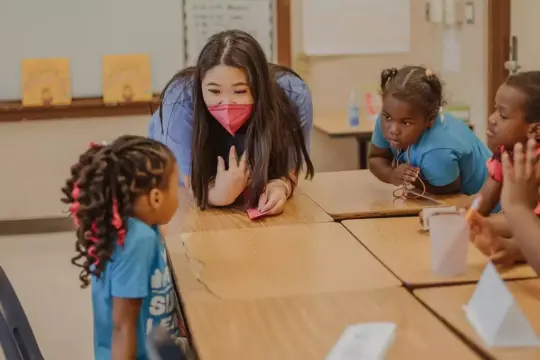
Where Passion Meets Purpose
Straight from the Nest
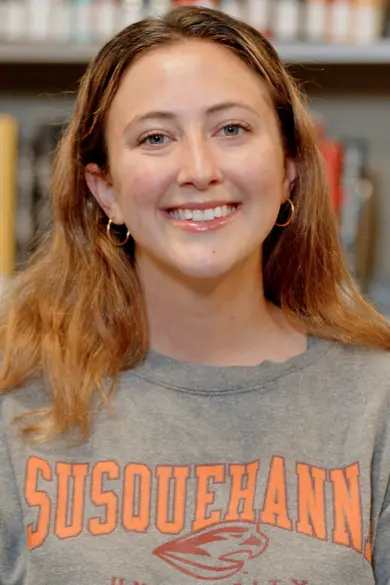

“The Early Education program here is really personalized. They help you learn and grow, and it’s all hands-on. You’ll have so many observation experiences at schools in the nearby districts and on campus at the Summit Early Learning to help you have the experiences you need to succeed later.”
— Olivia Acri ’26
“Through engaging coursework and a variety of practical field experiences, Susquehanna education majors acquire the knowledge, skills and dispositions needed for effective teaching and school leadership.”
— David McLaughlin, department head
Meet the Faculty
TAKE A VIRTUAL TOUR
Launch ExperienceYOU MAY ALSO BE INTERESTED IN
See the full list of related programs on the School of Humanities page.
Have Questions?
Contact Us
Start your journey.
